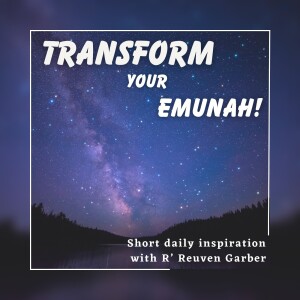
Thursday Oct 10, 2024
159 - Teshuvah
As we approach the great day of atonement and we prepare ourselves to be completely cleansed, now is the time to do some serious introspection and think deeply where we might have gone wrong and how we're going to go about rectifying that. Hashem understands that we're human beings limited by our human capacities with evil inclinations to sin. Hashem does not expect us to be sin-free and therefore He has gifted us with this tremendous gift of teshuvah where we have the opportunity to think what we have done wrong and do our best to rectify it by doing our best and committing to improve for the future. When an outright transgression is in question, which is relevant to all of us, of course the first step is rectifying the transgression itself.
"Hashem, I'm so sorry for using these eyes that you've given me such an incredible gift sometimes in an inappropriate manner. There were times that I viewed inappropriate things which are prohibited. Please forgive me for committing this transgression and please help me in the future, Hashem, to be able to appreciate that these eyes are a tremendous gift from you and never to use them to go against your will, God forbid, ever again. From my side, I'm going to make an extra effort to follow the halacha as the Gemara says that when I have two different roads to take to get to a certain destination and on the one road there is inappropriate material to potentially be viewed and the one there is not, even though it might be longer, I am required to take the longer route to avoid potentially coming to sin. In the future, Hashem, I'm going to try to be more careful even if it means taking longer to do my best to avoid sin. But Hashem, you know how hard this area is for me, so I'm begging you, please can you help me."
Another very important area where teshuva can be applicable and we can do our best to make change is that when it comes to all mitzvos, of course the performance of the mitzvah in the ideal way following the intricate details as prescribed by halacha is of paramount importance and definitely step number one. However, sometimes the second aspect of mitzvos is forgotten. The Arizal teaches that a mitzvah that is fulfilled with simcha, with joy and happiness compared to the same mitzvah that is fulfilled without joy and happiness are two different mitzvahs completely worlds apart. Let us take a few moments now to try be mindful to perhaps choose one mitzvah that we will do with utmost simcha, joy and enthusiasm.
"Hashem, please help me to internalize this belief that even though I don't experience the difference in a mitzvah done with simcha as opposed to a mitzvah done without simcha, help me to believe that they are completely worlds apart. Please Hashem, forgive me for all the times I did perform your mitzvahs, but I did so without enthusiasm. When I performed the mitzvah of washing my hands upon waking up in the morning, davening the prescribed prayers, giving charity, honoring my father and mother, I'm so sorry Hashem that most of the time when I did fulfill those mitzvahs, I usually performed them more out of rote and certainly not with a lot of enthusiasm and joy. Hashem, when I perform the mitzvah of washing my hands in the morning from tomorrow, bli neder, I'm going to try my best to just take a moment to reflect before I do so and try my best to do so with tremendous joy and enthusiasm. Thank you Hashem for all your incredible mitzvahs and the gift to be able to perform your mitzvahs with simcha."
No comments yet. Be the first to say something!